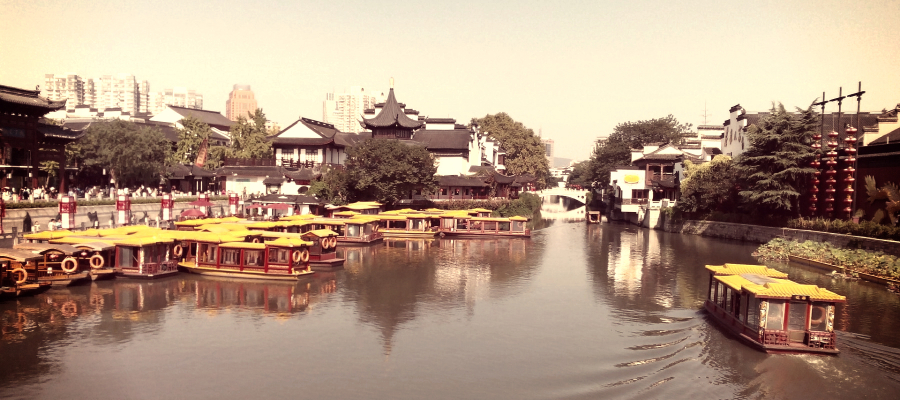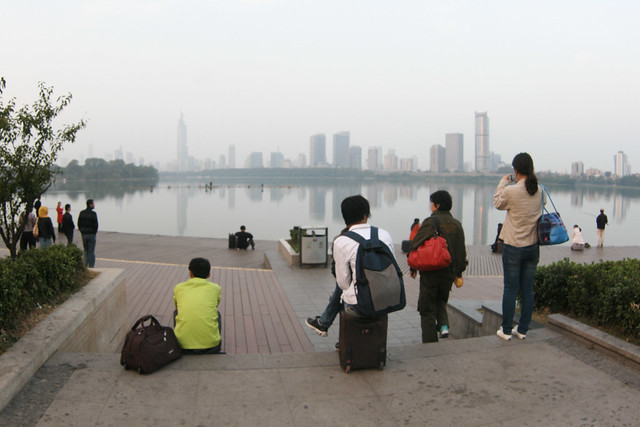
I guess I won’t eat sushi in China then because I don’t want to be smacked, slapped, kicked for being taken as a Japanese sympathizer. It was tough these days being Japanese or have anything to do with Japanese in China.
A group of Japanese expats was beaten up in Shanghai. These Japanese were having a meal with their Chinese colleagues when a mob performed a Jackie Chan style of attack on them, which put them in the hospital. In Xian, a local Chinese, real Chinese, not half Chinese, not foreign-born, got his head busted during an anti-Japan protest as he tried to keep a Chinese mob from damaging his Toyota. A few Japanese businesses had to put up signs showing their support for China.
In a highly controlled country like China, people cannot protest let alone protest at this magnitude unless they are blessed by the government, who is temporarily giving their citizen unlimited freedom of speech. I arrived in Beijing on September 17th, 2012 amidst the largest anti-Japan protest in 40 years – over the disputed sovereignty of Senkaku islands.
First of all, I don’t give a damn about any factual evidence over what belonged to whom. Any territorial claim requires a tedious examining of history which could go back hundreds of years. Furthermore, many such disputes are not based on historical evidence but more on who are the third parties residing over the resolution, and what their interests are. Territorial disputes and aggression over territory should have been a medieval affair and not something we still fight about in the modern era. Haruki Murakami, the famous Japanese author of “In the Norwegian Wood,” wrote: “Dispute over land existed because of the unfortunate system of dividing humanity into countries with national borders…We must be careful about politicians and polemicists who lavish us with this cheap liquor and fan this kind of rampage.”

Senkaku islands have been in Japan’s administration for over a century. The Treaty of Shimoneski, signed in 1895, granted Taiwan to Japan. Senkaku islands then belonged to Taiwan. However, the Chinese government has never recognized Taiwan as an independent country. Instead, Tawan is a part of the one China; thus, voila Senkaku belonged to China. China cited historical texts to prove their claim and argued that Japan lost their ownership of the islands when they returned Taiwan to China at the end of WWII, as a part of their surrender conditions. Japan said this islands wasn’t part of the deal.
So this was how it went down.
China: Yes you did.
Japan: No we didn’t.
USA & World: Hold on boys. So who did what?
China: The islands was part of our fishing islands since the Ming dynasty. (Note to readers: You don’t need to know when just know that it was a long time ago.)
Japan: You never cared about it until oil was discovered there. (Note to readers: Now we’re back to the source of all evil.)
The otherwise peaceful Chinese who were more into enjoying good food and working hard for money than voicing their opinions turned into a fanatic mob overnight.
But was their anger caused by the Japanese government trying to take Senkaku islands?
Territory aside, China and Japan have rarely been the best of friends. You can not have two leaders in the same group. The jungle cannot have two kings. Japan and China always seem to be on the opposite sides. Since ancient time, both were super powers and rivals in East Asia. During the last Chinese dynasty, they fought in the first Sino-China war, which resulted in China having to give up Taiwan and Senkaku islands. In the second world war, Japan was a major Fascist force while China sided with the Allied. Nowadays Japan is a democratic country and a staunch ally of the West, including the USA, one of their former enemies. On the other hand, the communist China joins another camp and opposes their former ally, the West.
But if you think this was the reason for China and Japan’s rocky relationship, you haven’t seen anything yet.
Another bigger incident involved Japan and China that got my attention – the reason I backtracked from Shanghai to Nanjing in the break of dawn at 3 a.m. and joined an army of overnight train passengers waiting for morning. Many years ago, I watched a documentary which made me want to throw up. The film was about Japan’s soldiers massacring thousands of Chinese when they captured Nanjing in 1937 during the second Sino-Japanese war.

Many years ago, I watched a documentary about the massacre of thousands of Chinese by Japanese soldiers during WWII (also the second Sino-Japanese war) when they captured Nanjing in 1937.
The killing, called “The Rape of Nanjing,” was one of the most brutal killings occurred during WWII. However, it barely attracted worldwide attention because perhaps neither the killers nor the victims were white, and whatever happened in Asia at the time was eclipsed by the genocide against the Jews in Europe.
Within six weeks of capturing Nanjing, then the capital of China, Japanese soldiers started looting, raping women of all ages, murdering civilians, sparing not even old people, women, and children, Their methods of killing made my stomach churn. Not only they gunned down their victims, but they also bayoneted them, chopped their hands off, or chopped their heads off. In many occasions, the soldiers did it for fun. One notorious event was the Hundred Head Contest started by two Japanese soldiers to see who would be the first one to kill 100 Chinese with swords. When these soldiers couldn’t decide who reached the 100 mark first, they increased the number to 150. Nanjing became the killing ground for Japanese soldiers whose “identity that is made of a bloody business with martial competitions, samurai ethics, and the fearsome warrior code of bushido,” wrote Irish Chang, author of the best-seller “The Rape of Nanking.” The death toll would have been more if it wasn’t for the Nanjing Safe Zone administrated by Westerners, mostly Americans and Germans. Many ring leaders and mastermind of the massacre received honor awards from the Emperor upon their return to Japan. When these criminals were finally brought to justice, one of them, Prince Asaka, got out scotch-free because he was an uncle of Emperor Hirohito, thereby received royal immunization from the laws.
China-Japan’s relationship probably wouldn’t deteriorate if Japan admitted and accepted the massacre as the Germans did for they had done during the war. The Germans took full responsibility for their past action. They educate their entire nation about their evil deed and protect the Jewish community and Jew organizations in Germany. On the contrary, Japan, for a long time, disputed the event despite a heap of evidence and confession from their own soldiers. They even printed textbooks with a different version of what happened in Nanjing.
It took 55 years for Japan to come to term with this. In 1995, Japanese prime minister Murayama issued the first formal apology to China. The Nanjing massacre is a sensitive issue to a Japan, a country where people identify with pride, honor, and discipline. Governmental officials still denied the fact and claimed it never happened including the mayor of Japan’s capital, Tokyo.
The memorial houses an indoor exhibition and an outdoor sculpture park. The exhibition was organized according to different phases of the war: the beginning of the war, Japan’s capture of Nanjing, the massacre, testimonies from survivors, media from Japan, Nanjing’s Safe Zone, intervention from local foreigners, and modern lawsuits.
Website: http://www.nj1937.org/english/default.asp
Warning: some of the photos are very graphic.
[slickr-flickr tag=”tj-nanjing” descriptions=”on” captions=”on”]